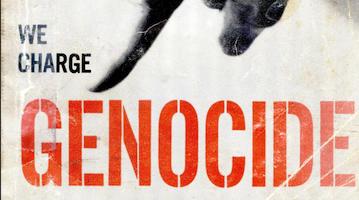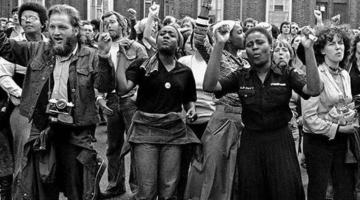Spending time in worlds of the past opens a window on how things changed, or stubbornly remained unchanged.
“Readers are challenged to see the past not as a closed book, something we have surpassed, but as a network of roads not taken.”
In this series, we ask acclaimed authors to answer five questions about their book. This week’s featured author is Ben Conisbee Baer. Baer is Associate Professor of Comparative Literature at Princeton University. His book is Indigenous Vanguards: Education, National Liberation, and the Limits of Modernism.
Roberto Sirvent: How can your book help BAR readers understand the current political and social climate?
Ben Baer: It’s a book about anticolonial and antiracist cultural and literary currents between the first and second world wars in the United States, French West Africa, the French Caribbean, Mexico, and India. It looks at how education systems were a tool of colonialism, nationalism, and social division and yet at the same time a possible site for making the minds and souls that could inhabit and live a non-imperial future. The best way to relate my account of all this to dilemmas in the present is probably twofold: first, to see it as deep background for problems that are still with us (the role and organization of public education in a democracy; the use of educational institutions to perpetuate class and race inequalities—but also their potential to fight such inequalities; the problem of imagining that structures such as racism can be overcome by cultural leadership alone). Second, to see the past not as a closed book, something we have surpassed, but as a network of roads not taken or even resources from which, if we work at it, future possibilities can emerge. This requires an actively and effortfully imagined attitude toward the past—not to think that we can represent the past “as it really was” and thereby convince ourselves that we have moved on, but to experience its otherness and difference as such in the still-active traces, patterns, and artifacts it has left with us. Because I am based in the literary humanities, my way of approaching this question is through the practice of reading as an exercise in living, for a time, in spaces very unlike my own. Places where other priorities may question what I think I know and my own sense of autonomy and self-importance. But this can be done by other means in other areas. Wherever you are, it’s very hard. It’s also true that one has to learn how to exercise one’s imagination in these ways, which is why education, from primary school on up, is such a central concern of the book. To paraphrase Marx, “who will educate the educators?”
What do you hope activists and community organizers will take away from reading your book?
I would be delighted if activists and community organizers read the book! It’s written, for better and worse, for an academic or scholarly audience, but for all that I hope not entirely inaccessible to a broader readership. Activists and community organizers already know that educational institutions can be as much an instrument of perpetuating social injustice as a means of repairing injustices. They can be both poison and medicine. An example from the book would be the way in which the Martinican poet and politician Aimé Césaire used the elements of his colonial French primary schoolbooks (cahiers) to create a magical long poem that invites us to imagine the colonizer’s language and soul-making systems not simply as tools of oppression but as a site of struggle against it. As something too valuable just to be thrown away. In this sense, Césaire asks us to do the difficult task of imagining a situation not of us and them, good vs. evil (even though we might feel this way about the horrors of colonial violence, exploitation and racism), but of understanding the enemy so intimately that you can find the points in his system to turn it toward a future different from the one it wants to program. Just as the Haitian rebels who founded the first black republic made the “liberty and equality” of the French Revolution their own. This is a different proposition than being co-opted by power, and is in a sense an argument that one can indeed use “the master’s tools” to take down his house.
We know readers will learn a lot from your book, but what do you hope readers will un-learn? In other words, is there a particular ideology you’re hoping to dismantle?
I don’t know what readers might unlearn. My hope is that I will one day myself unlearn or revise my thinking from the unexpected and unforeseen responses of the book’s readers. Ideology is a strange thing, embedded as much in daily practices as it is in representations and ideas. So you can dismantle an ideology in theory (in writing or argument) but people still keep doing the same old things and thus keep the ideology intact in practice. A lone book can’t hope to do very much in this regard, and maybe this is something I try and convey: a sense of the limits of scholarly and artistic activity, important and transformative as these things are in their own domains, if they’re not connected to real and detailed efforts at ground-level change. That’s certainly one dilemma that the intellectuals I write about in my book were attempting to negotiate. I don’t necessarily advocate doing “activist art” or “radical pedagogy” to short-circuit the problem. The works of art that we can learn from best are not always ones that have an obvious political message. Rather, their difference and counterintuituveness might ask us to question the terms in which we think and do our politics. But again this is a question of education, as you have to learn how to access or get close to these elements of difference and get out of your own head and assumptions a bit.
Who are the intellectual heroes that inspire your work?
I’m not a huge fan of the notion of heroes in the colloquial sense, as it can entail too much of an uncritical attitude of worship or imitation. The notion of “hero” for me immediately evokes the genre of tragedy—not in the sense that things always turn out badly, but in the sense that the hero is always part of a history bigger than him- or herself. A history the shape of which escapes the hero and undoes or radically transforms his or her greatest efforts even as s/he diverts its course. This is of course the case in a small way with intellectual heroes: things are done with their work that are utterly unpredictable and would perhaps be horrifying or unacceptable to them, but over which they have little or no control. But to name some names, one of the figures from whom I learned a great deal in making Indigenous Vanguards is the Italian philosopher Antonio Gramsci. In the Gramscian vein, Stuart Hall, the Jamaican-born founder of Cultural Studies in Britain, is an incredible example of innovative ways of being an intellectual. As will be obvious from these names and from the book itself, Marx is a very significant figure for me intellectually. And finally, my former teacher Gayatri Chakravorty Spivak remains a touchstone for my work, someone from whom I continue to learn.
In what way does your book help us imagine new worlds?
You tell me! That’s for readers to decide. I would hope that my discussions of education in situations of crisis and extremity—but also as a normalized part of modern societies—illuminate that its painstaking practice is one of the few hopes we have for imagining new worlds, more just worlds. Not in the sense of producing pictures of future worlds (though this is important) but of making the minds and souls capable of imagining them, desiring them, working for them. Indigenous Vanguards makes its argument through close engagements with writings by Alain Locke, Du Bois, Léopold Senghor, Aimé Césaire, Mahatma Gandhi, Rabindranath Tagore and several others. This is itself an exercise in imagining new and other worlds: I have attempted to show what it is like to spend time in others’ worlds, to understand the problems confronted by folks I have never met and to learn about them on their terms. This is the first step in exercising the imagination, and it’s for unknown readers to judge the extent to which I have been successful.
Roberto Sirvent is Professor of Political and Social Ethics at Hope International University in Fullerton, CA. He also serves as the Outreach and Mentoring Coordinator for the Political Theology Network. He is co-author, with fellow BAR contributor Danny Haiphong, of the new book, American Exceptionalism and American Innocence: A People’s History of Fake News—From the Revolutionary War to the War on Terror.
COMMENTS?
Please join the conversation on Black Agenda Report's Facebook page at http://facebook.com/blackagendareport
Or, you can comment by emailing us at comments@blackagendareport.com



















